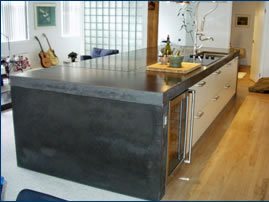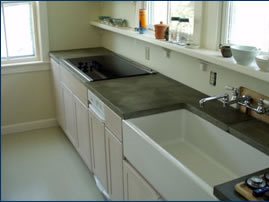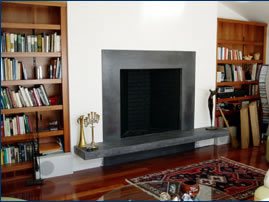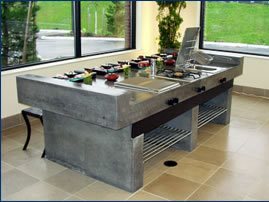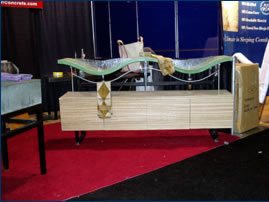- Staining Concrete
- Stamped Concrete
- Concrete Overlays
- Concrete Resurfacing
- Concrete Polishing
- Concrete Dyes
- Colored Concrete
- Indoor Concrete
- Concrete Floors
- Concrete Countertops
- Garage Floor Coatings
- Furniture, Sinks, Fire Bowls
- Basement Floors
- Outdoor Concrete
- Concrete Patios
- Concrete Driveways
- Concrete Pool Decks
- Outdoor Kitchens & Counters
- Outdoor Fireplace
- Concrete Walkways
- Concrete Pavers
- Concrete Walls
- Repair & Maintenance
- Foundation Repair
- Concrete Crack Repair
- Concrete Sealers
- Building with Concrete
- Concrete Homes
- Concrete Basements
- Decorative Concrete
- Fire Resistant
The Science of Form Function in Rowley, MA
While no one can argue that the world of decorative concrete is grounded in science, for Raymond Iacobacci, owner of Form Function in Rowley, Mass., science was the ultimate backdrop for his current passion and profession.
Educated as research biologist at the University of Colorado, Iacobacci immersed himself in the medical research industry for over 10 years before his true calling came knocking, but not without some detours along the way. Iacobacci left research and went on to get his Ph.D. in neuroscience, but after a while he stopped, changing his life's course and, ultimately, his career. He turned to architecture, studying at Boston Architectural College for the next four years.
"It was a tough, long program," he recalls. "I was four years into it and moved to New York after I got married. Subsequently, we moved back to Boston where, I became a licensed contractor. "This was the early 90s, and I was playing around with concrete," he explains, adding that the leap into contracting was not unusual given that his father was an electrician, so he "grew up in the trades."
And, like most, his foray into decorative concrete was born of necessity. "I was renovating a house that needed a countertop, and I was on a tight budget, so I decided to make a concrete countertop," Iacobacci laughs. "I tried it and made all the rookie mistakes that first time, but in the end it looked pretty good...My sister moved into that house and loved the countertop."
But at that time, he says there wasn't a strong market for concrete countertops, so instead he offered them as part of the scope of work he could provide as a general contractor. "Then HGTV happened, and it seemed like every night there was something on about decorative concrete," he explains. "I got hooked on HGTV, and I felt that finally there was a market for it."
So Iacobacci says he pursued decorative concrete as a sideline, thinking maybe he would do a few projects a year, in the process earning some extra money. That was six years ago, and he's been working non-stop ever since, traveling all over New England, and occasionally going into Maine, Connecticut, Rhode Island, western Massachusetts, and even Martha's Vineyard for jobs.
Last year, Form Function's portfolio was made up of primarily residential work, but Iacobacci says the commercial side has been increasing, particularly the restaurant and bar arenas. "Architects have finally caught on to the product and are specking it out, realizing that it offers very few design limitations," he notes, adding that in recent months, his work has included renovating an office space and break room at Harvard University, adding decorative concrete elements to a reception area at Brown University, and putting decorative concrete in a bio tech company's cafeteria.
Form Function offers decorative concrete sinks, fireplaces, countertops, hearths and wall panels. The wall panels, not to be confused with tiles, are custom made and flexible as far as color and size, which Iacobacci says can open up designing to more interesting looks. For instance, Form Function recently collaborated with high-end architect Maryann Thompson, creating wall panels 4 feet tall, 5 feet wide and 1 inch thick to use to veneer a shower enclosure for a residence.
The company is also branching out into outdoor work, such as decorative concrete grill enclosures for rooftop decks, which Iacobacci says landscape architects are specking out. "We're building monolithic food stations and sliding stainless steel grills in them," he adds.
Form Function has also created what they call the "ribbon sink," which is 1 ½-inch thick concrete that oscillates up and down to make a double bowl sink, spanning 12 to 14 inches in width, with glass front and back panels. The whole thing is mounted on the wall with stainless steel brackets. "It looks light because there's no excess concrete," explains Iacobacci. "I developed it a couple of years ago, and I have a single version too. It was developed as a concept piece to push the envelope—to say 'this is what you can do with concrete.' It shows you can do anything with it, and it still functions."
Acknowledging that there's both tremendous science and art involved in the decorative concrete industry, Iacobacci is unusual in that he's completely self taught. He credits his research background with his ability to come so far so fast.
But Iacobacci's not resting on his laurels, either. "I'm always looking for new methods," he comments. "I have casting tables I designed and built, which are reusable and efficient. I'm able to offer competitive prices because of my casting methods." Although Form Function is a small operation, with one employee besides Iacobacci, because of the way they work, Iacobacci says "they can still pump out a lot with the four casting tables." "It's a modular set-up that's very efficient and fast to set up and break down," he notes.
"We have to stay competitive with granite and Corian, because if not the market is going to shrink," Iacobacci concludes. "But there will always be a few people that want concrete no matter what. Luckily, it's up to your imagination what you can do with [concrete]."
Form Function
Raymond Iacobacci
PO Box 103
Rowley, MA 01969
(978) 432-1093 Office
(978) 948-3578 Fax
Send Mail Now - Click Here
http://www.formfunctionconcrete.com
